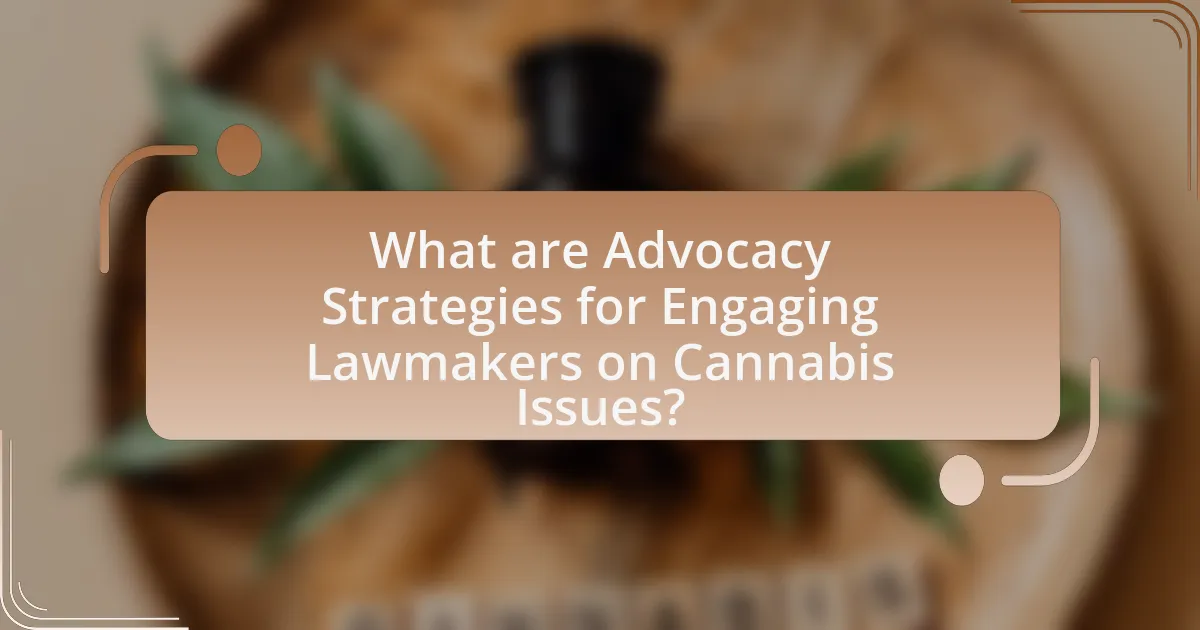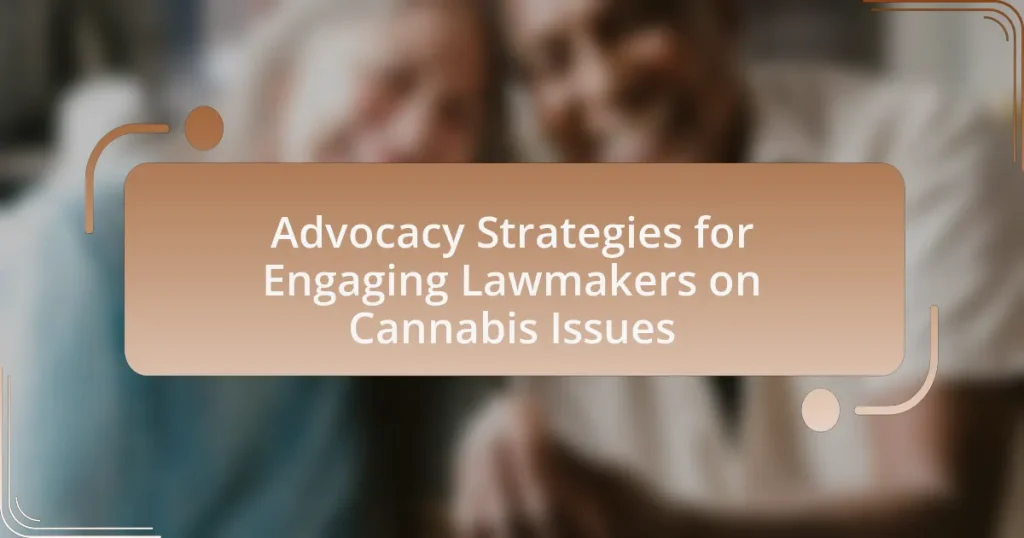The article focuses on advocacy strategies for engaging lawmakers on cannabis issues, emphasizing the importance of coalition-building, data-driven arguments, and personal relationships with legislators. It outlines how effective advocacy can influence cannabis legislation, impacting public health, criminal justice, and economic opportunities. Key components of successful advocacy include clear messaging, stakeholder engagement, and grassroots mobilization, while challenges such as limited access to lawmakers and misinformation are also addressed. The article highlights the role of public opinion and personal stories in shaping legislative decisions, providing practical tips for advocates to enhance their strategies and maintain ongoing relationships with lawmakers.

What are Advocacy Strategies for Engaging Lawmakers on Cannabis Issues?
Advocacy strategies for engaging lawmakers on cannabis issues include building coalitions, utilizing data-driven arguments, and fostering personal relationships with legislators. Building coalitions with diverse stakeholders, such as medical professionals, business owners, and community leaders, strengthens the advocacy effort by presenting a united front. Utilizing data-driven arguments, such as statistics on tax revenue from legalized cannabis in states like Colorado, which generated over $1.7 billion in tax revenue since legalization, provides lawmakers with concrete evidence of the benefits. Fostering personal relationships through regular communication, attending town hall meetings, and inviting lawmakers to community events creates trust and opens channels for dialogue, making lawmakers more receptive to cannabis-related legislation.
Why is engaging lawmakers on cannabis issues important?
Engaging lawmakers on cannabis issues is important because it directly influences legislation that affects cannabis policy and regulation. Lawmakers have the power to create, amend, or repeal laws that govern cannabis use, cultivation, and distribution, which can significantly impact public health, criminal justice, and economic opportunities. For instance, states that have legalized cannabis have seen increased tax revenues and reduced incarceration rates for cannabis-related offenses, demonstrating the tangible benefits of effective advocacy. Engaging with lawmakers ensures that the voices of constituents, including patients, businesses, and advocates, are heard, leading to more informed and equitable policy decisions.
What impact do lawmakers have on cannabis legislation?
Lawmakers significantly influence cannabis legislation by creating, amending, and repealing laws that govern cannabis use, distribution, and regulation. Their decisions shape the legal landscape for cannabis at both state and federal levels, impacting access, taxation, and criminal penalties associated with cannabis. For instance, as of 2023, 38 states have legalized medical cannabis, largely due to legislative efforts spearheaded by lawmakers responding to public demand and advocacy. Additionally, lawmakers play a crucial role in determining funding for cannabis research and public health initiatives, which can further affect how cannabis is perceived and regulated in society.
How can public opinion influence lawmakers’ decisions on cannabis?
Public opinion significantly influences lawmakers’ decisions on cannabis by shaping their perceptions of public support or opposition. When a substantial portion of the electorate expresses favorable views on cannabis legalization or reform, lawmakers are more likely to align their policies with these sentiments to secure votes and maintain political support. For instance, a 2021 Gallup poll indicated that 68% of Americans support legalizing cannabis, which has prompted numerous states to reconsider their cannabis laws. This correlation between public opinion and legislative action demonstrates that lawmakers often respond to constituents’ preferences to reflect their values and priorities.
What are the key components of effective advocacy strategies?
The key components of effective advocacy strategies include clear messaging, stakeholder engagement, and strategic coalition-building. Clear messaging ensures that the advocacy goals are communicated succinctly and persuasively, which is essential for capturing the attention of lawmakers. Stakeholder engagement involves identifying and mobilizing individuals and organizations that share common interests, thereby amplifying the advocacy efforts. Strategic coalition-building fosters partnerships among diverse groups, enhancing credibility and resource sharing, which is crucial in influencing policy decisions. These components are supported by successful advocacy campaigns, such as the legalization of cannabis in various states, where organized efforts led to significant legislative changes.
How do grassroots movements contribute to advocacy efforts?
Grassroots movements significantly enhance advocacy efforts by mobilizing community members to influence policy change. These movements create a collective voice that amplifies individual concerns, making them more visible to lawmakers. For instance, the legalization of cannabis in various states has often been driven by grassroots campaigns that organized public demonstrations, petitions, and social media outreach, effectively raising awareness and support among the general public and legislators. Research indicates that grassroots advocacy can lead to increased voter engagement and pressure on policymakers, as seen in the 2016 election cycle where cannabis-related measures gained traction due to organized grassroots efforts.
What role do coalitions play in cannabis advocacy?
Coalitions play a crucial role in cannabis advocacy by uniting diverse stakeholders to amplify their collective voice and influence policy change. These coalitions often consist of advocacy groups, industry representatives, medical professionals, and community organizations, which allows for a broader representation of interests and perspectives. By pooling resources and expertise, coalitions can effectively mobilize public support, engage lawmakers, and provide comprehensive data and research to inform policy discussions. For instance, the National Cannabis Industry Association has successfully lobbied for legislative reforms by leveraging the combined efforts of its members, demonstrating the power of coalition-building in achieving advocacy goals.
What methods can be used to engage lawmakers effectively?
To engage lawmakers effectively, advocacy groups should utilize direct communication, grassroots mobilization, and data-driven presentations. Direct communication involves scheduling meetings with lawmakers to discuss specific cannabis issues, allowing advocates to present their perspectives and answer questions. Grassroots mobilization encourages constituents to contact their representatives, demonstrating public support for cannabis-related legislation. Data-driven presentations provide lawmakers with research and statistics that highlight the benefits of cannabis legalization, such as economic growth and public health improvements, thereby reinforcing the argument for policy change. For instance, a study by the National Organization for the Reform of Marijuana Laws (NORML) found that states with legalized cannabis experienced a significant increase in tax revenue, which can be a compelling point for lawmakers considering legalization.
How can personal stories influence legislative change?
Personal stories can significantly influence legislative change by humanizing complex issues and creating emotional connections with lawmakers. When individuals share their experiences related to cannabis use, such as medical benefits or legal challenges, they provide lawmakers with relatable narratives that can shift perceptions and priorities. For instance, the legalization of medical cannabis in various states has often been propelled by personal testimonies from patients who experienced relief from chronic pain or other conditions, demonstrating the tangible impact of these stories on policy decisions. Research indicates that narratives can be more persuasive than statistics alone, as they evoke empathy and prompt lawmakers to consider the real-life implications of their legislative choices.
What are the best practices for organizing meetings with lawmakers?
The best practices for organizing meetings with lawmakers include thorough preparation, clear objectives, and effective follow-up. Preparation involves researching the lawmaker’s background, interests, and previous stances on cannabis issues, which allows advocates to tailor their message effectively. Setting clear objectives helps in communicating specific goals, such as supporting legislation or addressing concerns. Effective follow-up, including sending thank-you notes and providing additional information, reinforces the relationship and keeps the dialogue open. These practices enhance the likelihood of productive engagement and influence on cannabis policy.
How can data and research support advocacy efforts?
Data and research can significantly enhance advocacy efforts by providing evidence-based support for policy changes. For instance, studies demonstrating the medical benefits of cannabis, such as the 2017 National Academies of Sciences report, which found substantial evidence that cannabis can alleviate chronic pain, can be used to persuade lawmakers to consider legalization or reform. Additionally, statistical data on public opinion, such as the 2021 Gallup poll showing that 68% of Americans support cannabis legalization, can strengthen advocacy campaigns by illustrating widespread public backing. This combination of empirical evidence and public sentiment creates a compelling case for lawmakers to act on cannabis-related issues.
What types of data are most persuasive in cannabis advocacy?
Quantitative data, such as statistics on cannabis use, economic benefits, and public health outcomes, are the most persuasive in cannabis advocacy. For instance, studies show that states with legalized cannabis have seen a significant increase in tax revenue; Colorado reported over $1.7 billion in cannabis tax revenue from 2014 to 2021. Additionally, data indicating reduced opioid prescriptions in states with legal cannabis can effectively sway lawmakers by highlighting potential public health benefits. Furthermore, surveys revealing public support for cannabis legalization, such as a 2021 Gallup poll showing 68% of Americans favor legalization, provide compelling evidence for advocacy efforts.
How can research findings be effectively communicated to lawmakers?
Research findings can be effectively communicated to lawmakers by presenting clear, concise, and actionable information tailored to their interests and priorities. Utilizing executive summaries, infographics, and policy briefs can distill complex data into digestible formats that highlight key implications for legislation. For instance, studies such as “The Impact of Cannabis Legalization on Public Health” published in the Journal of Public Health demonstrate how data-driven insights can inform policy decisions, showing lawmakers the potential benefits and risks associated with cannabis legislation. Engaging lawmakers through direct meetings, providing them with relevant research, and aligning findings with their legislative goals further enhances the effectiveness of communication.
What challenges do advocates face when engaging lawmakers?
Advocates face several challenges when engaging lawmakers, primarily including limited access to decision-makers, competing interests, and a lack of understanding of cannabis issues. Limited access arises because lawmakers often prioritize their time for constituents and lobbyists with established relationships, making it difficult for advocates to present their case. Competing interests from powerful lobbying groups can overshadow the voices of advocates, particularly in the cannabis sector, where large corporations may exert significant influence. Additionally, many lawmakers may lack comprehensive knowledge about cannabis-related topics, which can hinder productive discussions and the formulation of informed policies. These challenges are evident in legislative processes where advocates struggle to gain traction for cannabis reform initiatives.
How can advocates overcome resistance from lawmakers?
Advocates can overcome resistance from lawmakers by building strong relationships and providing clear, evidence-based information. Establishing trust through consistent communication and collaboration can help lawmakers feel more comfortable with the proposed changes. For instance, presenting data from reputable studies, such as the National Academies of Sciences, Engineering, and Medicine report on cannabis, which highlights the potential benefits and risks, can effectively address concerns. Additionally, engaging constituents to share personal stories can humanize the issue and demonstrate public support, making lawmakers more likely to reconsider their stance.
What strategies can be employed to address misinformation about cannabis?
To address misinformation about cannabis, educational campaigns that provide accurate, research-based information are essential. These campaigns should target both the general public and lawmakers, utilizing various platforms such as social media, community workshops, and informational websites. Research indicates that misinformation can be effectively countered by presenting clear, factual data; for instance, studies from the National Academies of Sciences, Engineering, and Medicine highlight the therapeutic benefits of cannabis, which can help dispel myths. Additionally, collaboration with credible organizations and experts in the field can enhance the credibility of the information being disseminated, further combating misinformation.
How can advocates measure the success of their strategies?
Advocates can measure the success of their strategies by analyzing specific metrics such as legislative outcomes, public opinion shifts, and engagement levels with lawmakers. For instance, tracking the number of bills passed or amended in favor of cannabis issues directly reflects the effectiveness of advocacy efforts. Additionally, surveys and polls can quantify changes in public support for cannabis legislation, providing concrete evidence of advocacy impact. Engagement metrics, such as the number of meetings with lawmakers or participation in advocacy events, also serve as indicators of strategy effectiveness, demonstrating increased visibility and influence in the legislative process.
What metrics should be used to evaluate advocacy effectiveness?
To evaluate advocacy effectiveness, key metrics include legislative outcomes, stakeholder engagement, public awareness, and media coverage. Legislative outcomes measure the success of advocacy efforts in influencing policy changes, such as the passage of cannabis-related bills. Stakeholder engagement assesses the level of involvement from lawmakers, community members, and organizations, indicating the breadth of support for advocacy initiatives. Public awareness can be gauged through surveys or social media analytics, reflecting how well the advocacy message has reached and resonated with the target audience. Media coverage quantifies the amount and tone of press attention received, which can amplify advocacy efforts and shape public perception. These metrics collectively provide a comprehensive view of advocacy effectiveness in the context of cannabis issues.
How can feedback from lawmakers inform future advocacy efforts?
Feedback from lawmakers can significantly inform future advocacy efforts by providing insights into legislative priorities and concerns. When lawmakers express their views on cannabis-related issues, advocates can tailor their strategies to align with these priorities, increasing the likelihood of legislative support. For instance, if lawmakers indicate a need for more data on public health impacts, advocates can focus on gathering and presenting relevant research to address these concerns. This approach not only enhances the credibility of advocacy efforts but also fosters a collaborative relationship with lawmakers, ultimately leading to more effective policy outcomes.
What are some best practices for ongoing engagement with lawmakers?
Best practices for ongoing engagement with lawmakers include establishing regular communication, providing clear and concise information, and building personal relationships. Regular communication ensures that lawmakers are kept informed about cannabis issues and developments, which can influence their decision-making. Clear and concise information, such as data on public opinion or economic benefits, helps lawmakers understand the importance of cannabis-related policies. Building personal relationships through meetings, events, and follow-ups fosters trust and makes lawmakers more receptive to advocacy efforts. These practices are supported by successful advocacy campaigns that have demonstrated the effectiveness of consistent engagement in shaping legislative outcomes.
How can advocates maintain relationships with lawmakers over time?
Advocates can maintain relationships with lawmakers over time by consistently engaging in open communication and providing valuable information relevant to legislative priorities. Regularly updating lawmakers on developments in cannabis issues, sharing research findings, and offering expert testimony can reinforce the advocate’s role as a trusted resource. Additionally, attending public meetings, hosting events, and facilitating discussions can strengthen personal connections. Studies show that sustained engagement leads to more favorable legislative outcomes, as lawmakers are more likely to support initiatives from advocates they know and trust.
What role does follow-up communication play in advocacy success?
Follow-up communication is crucial for advocacy success as it reinforces relationships and maintains momentum in discussions with lawmakers. Effective follow-up ensures that advocates remain on the radar of decision-makers, providing them with additional information, addressing concerns, and demonstrating ongoing commitment to the cause. Research indicates that consistent follow-up can increase the likelihood of legislative support; for instance, a study by the National Conference of State Legislatures found that lawmakers are more likely to respond positively to advocates who engage in regular communication. This ongoing dialogue not only helps to clarify positions but also builds trust, making it more likely that lawmakers will consider the advocate’s perspective when making decisions on cannabis-related legislation.
What practical tips can enhance advocacy strategies for cannabis issues?
To enhance advocacy strategies for cannabis issues, advocates should focus on building strong coalitions and utilizing data-driven messaging. Strong coalitions amplify voices and resources, allowing for a unified front that can influence lawmakers more effectively. Data-driven messaging, supported by research from organizations like the National Organization for the Reform of Marijuana Laws (NORML), demonstrates the economic benefits of cannabis legalization, such as increased tax revenue and job creation, which can persuade policymakers. Additionally, engaging in grassroots mobilization, where community members share personal stories and experiences, can humanize the issue and create emotional connections with lawmakers.


